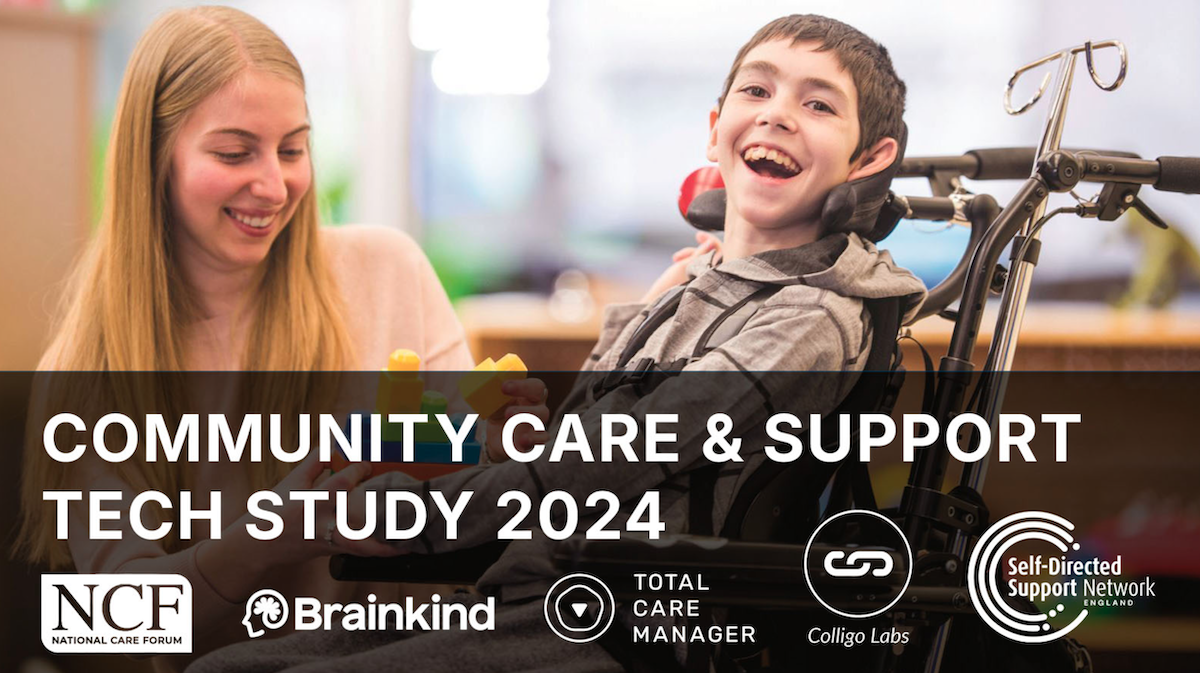Coalition launches landmark study into use of care tech in the community

A coalition of UK care sector organisations has launched a first-of-its-kind study into the penetration of care management software in community care settings.
Unlike previous studies, this survey actively seeks participation from the family members and support networks of people receiving care, including unpaid carers.
The stakeholders behind the study include National Care Forum, the leading association for not-for-profit social care, brain injury charity Brainkind and Total Care Manager, the complex care management platform.
Also in the coalition are Colligo Labs, a transformation consultant to care businesses, and Self-Directed Support Network England, which provides peer-led problem solving, access to sector specialists, resources and learning opportunities to health and social care commissioners, operational teams and service providers.
This study comes in a year in which care tech adoption has moved at pace, with just over 70 per cent of care providers now using a digital social care record (DSCR) solution.
A previous government-backed target for 80 per cent adoption by March 2024 was missed; with government analysis showing that the largest and smallest providers are the least likely to have made the switch from paper.
The organisers hope the study will reveal details about the obstacles to technology adoption at every level of the care sector, and help the industry identify where the greatest support is needed for digital transformation.
In particular, the organisers are concerned about complex care and people with lifelong support needs, where some of the most highly-dependent people are cared for by some of the smallest businesses.
The survey can be completed anonymously, it takes about 10 minutes, and is open to anyone who provides care or support – whether as a care professional, a family member, or a member of a support network.
Click below to fill out the survey
Graham Fisher, digital director, Brainkind, said: “It’s increasingly recognised that the methods used for reporting and management have a direct impact on the quality and safety of care delivery. That’s why at Brainkind we’ve invested heavily in digital care records for all our services. As a large charity, we were fortunate to have multiple providers competing for our business which helped us find an appropriate solution within our budget.
“Unfortunately, it’s a very different picture in the community-based care of people brain injury or other complex needs. The consequence is that the care of some of society’s most highly dependent people is being managed with the most rudimentary systems, often paper and Excel.
“We’re pleased to be backing this research because it will help to quantify the scale and extent of this challenge.
“The hope is that when people leave our services in the near future, the new care setting will be using similarly capable software that we’re using at Brainkind, giving all relevant stakeholders access to the primary care record, and allowing everyone to collaborate to support the person in living their best lives in the community.”
Antoine Tooley, CEO, Total Care Manager, said: “Thousands of people in the UK have support needs relating to conditions such brain trauma or learning disability.
“Whilst these people are relatively few in number compared to those receiving dementia care, they typically receive lifelong care over decades, often in their family homes and supported by specialist case management companies. In some cases, these individuals’ care budgets operate like a business, directly employing teams of over a dozen support professionals and receiving 24-hour, two-to-one care.
“The goal for many of these people, and their families and support networks, is to be able to live safely at home with the greatest level of independence possible. This is challenging where the level of management, reporting and clinical risk is comparable to what you’d find in a hospital – but where the care takes place in a person’s home.
“Care management software has proven invaluable in helping to manage this complexity across the adult social care sector, and should equally be available in community-based care, so that stakeholders can collaborate towards supported peoples’ desired care outcomes, and help disabled people live their best possible lives.”
Liz Jones, policy director, National Care Forum, said: “When people think of the care sector, they think of care agencies and care homes and more formally structured organisations which are being urged to use/adopt digital systems.
“We recognise however that the delivery of care and support varies widely beyond care agencies and homes, which means that we really need to understand better how to develop solutions which are appropriate for different care settings and types of support needs.
“Our own contribution to this progress is the annual Care Innovation Challenge, run in collaboration with Think Local Act Personal, to connect innovators with key industry stakeholders and incubate new ideas with the promise to meaningfully drive progress in adult social care.
“We hope this study will throw light on how technology provision varies across adult social care, and indicate where there’s the greatest need for change.
Chris Watson, Colligo Commissioning Labs and chair of SDS Network England, added: “Many people using Self-Directed Support (SDS) funding are left to manage their care and support arrangements alone and without care management systems in place, which can create numerous challenges.
“While SDS offers greater choice and control, it often requires individuals to navigate their care and support needs, manage budgets, and coordinate their support teams, all without any digital infrastructure to support them.
“For people with lifelong care and support needs and their families, this can sometimes be overwhelming. If we are truly committed to promoting choice, independence, and self-direction, we must work harder to ensure that individuals using SDS have access to the same tools and systems that are available to more traditional care providers.
“Only then can we really support and empower individuals and families to take control of their care and grow the numbers of people benefitting from local authority or NHS personal budgets.”










